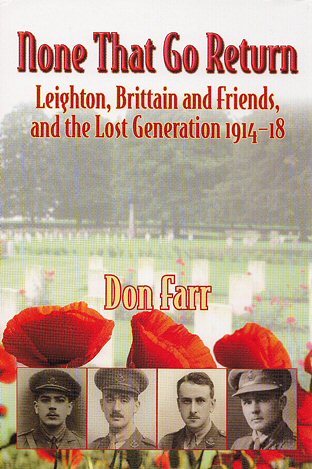NONE THAT GO RETURN
LEIGHTON, BRITTAIN AND FRIENDS, AND THE LOST GENERATION 1914-18
 by Don Far
by Don Far
Publishers: Helion & Company Limited
Website: www.helion.co.uk
First published November 2010
Hardback (232 pages) 234mm x 156mm
50 b/w photos, maps, 8pp colour photos & maps
This fascinating book is a biographical study of four men who were all closely interlinked with Vera Brittain before and during the First World War. None of them returned.
Roland Leighton (Worcestershire Regiment), Edward Brittain, Victor Richardson and Geoffrey Thurlow typify the experiences of many in a world turned upside down by the outbreak of the Great War in early August 1914. They were all on the threshold of entry into Oxbridge. Only days later, all thoughts of university cast aside by three of them, they sought instead army commissions to serve as infantry subalterns. Geoffrey Thurlow, would complete a term at Oxford before following the same path.
All four were well-educated scions of prosperous families. Three of them had the casual self-confidence that such a background usually endowed; Thurlow, was curiously tortured by self-doubt. They would all have absorbed the easy assumptions about Britain's place in the pre-war world even before entering their public schools. There these assumptions would have been reinforced by team games, military training and schoolmasterly exhortation. The so-called public school ethos played a major part in inculcating an almost conditioned reflex to any threat to Britain's security and honour.
It was not just in the public schools that their ethos held sway. Novels and comics about public schools and schoolboys were universally popular. A remarkable feature of the days following the declaration of war was the torrent of young men who besieged Army recruiting offices seeking to volunteer. Not all of them were motivated by pure patriotism, although most certainly were. Some, whose background and qualities fitted them to become officers, were so keen to do their bit that they volunteered to serve in the ranks.
Many of them would end by lending credence to the notion of the 'Lost Generation'. The belief that the enormity of the casualty lists, especially among the well-educated and privileged, amounted to the loss of a generation of future leaders in every field, gained a hold on the popular imagination in the aftermath of the War. Whether this belief can be supported statistically or, was merely impressionistic and largely based on disillusionment with developments between the two world wars will be assessed in the book.
